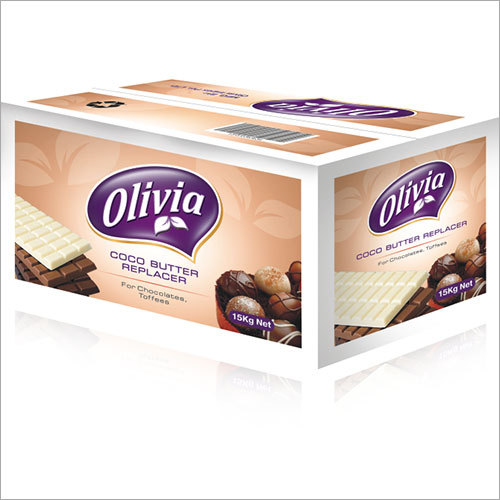
Coco butter substitute (CBS)
800.00 USD ($)/Metric Ton
Product Details:
- Grade As per client requirements
- Product Name Cocobutter Substitue
- Form Solid
- Usage Chocolates, Moulded Products, Biscuit Coating
- Click to View more
X
Coco butter substitute (CBS) Price And Quantity
- 800.00 USD ($)/Metric Ton
- 1 Metric Ton
Coco butter substitute (CBS) Product Specifications
- Cocobutter Substitue
- Chocolates, Moulded Products, Biscuit Coating
- Solid
- As per client requirements
Coco butter substitute (CBS) Trade Information
- Any Malaysia/Indonesia ports
- Letter of Credit (L/C) Letter of Credit at Sight (Sight L/C) Telegraphic Transfer (T/T)
- 1 Months
- Yes
- Free samples are available
- Packed in 20kg cartons
- We are working with all ISO, GMP, Kosher, etc certified factories from Malaysia/Indonesia
Product Description
Cocobutter Substitute is created especially for setting the liquid fat in fillings made from hazelnut, peanut, and almonds. It does not require tempering and crystallises into a single stable form. It doesnt taste soapy because it doesn't include lauric fats. It is compatible with other filling fats such as liquid nut oils, cocoa butter, and butter oil. This product is frequently used in the confectionery and baking sectors because it resists oxidation in the production of chocolate goods, biscuit and waffle fillings, and confectionery coating.
Usage of Coco Butter Substitute:
Cocoa butter is a popular natural fat extracted from cocoa beans and is commonly used in various culinary and cosmetic applications. However, some people may need to find alternatives due to dietary restrictions, allergies, or personal preferences. Here are some common cocoa butter substitutes and their suggested usages:
1. Shea Butter: Shea butter is a popular substitute for cocoa butter in cosmetic and skincare products. It has similar properties and can be used in lotions, creams, balms, and soaps. It is also edible and can be used in certain recipes, but keep in mind that it has a slightly different flavor profile.
2. Mango Butter: Mango butter is another excellent substitute for cocoa butter in skincare products and recipes. It has a sweet aroma and can be used to create balms, lotions, and body butters. In cooking, it can be used in desserts, sauces, and confections.
3. Coconut Oil: While not a direct substitute in terms of consistency, coconut oil can be used as a replacement for cocoa butter in some recipes. It works well in recipes where the cocoa flavor is not critical. Coconut oil is commonly used in baking, cooking, and making homemade chocolates.
4. Avocado Butter: Avocado butter is a creamy and nourishing substitute for cocoa butter in skincare products. Its rich in nutrients and can be used in lotions, creams, and balms.
5. Palm Oil: Similar to coconut oil, palm oil can be used as a substitute for cocoa butter in recipes. However, it's essential to consider the environmental impact of using palm oil, as unsustainable practices can contribute to deforestation and harm wildlife.
6. Almond Oil: Almond oil can be used as a light substitute for cocoa butter in some cosmetic applications and recipes. It adds a nutty flavor and can be used in baking and cooking.
7. Grapeseed Oil: Grapeseed oil can be used as a light substitute for cocoa butter in certain recipes, particularly in dressings, marinades, and sauteing.
FAQ:
Q. What is cocoa butter?
Ans: Cocoa butter is a natural fat extracted from cocoa beans. It's a key ingredient in chocolate production and is commonly used in various cosmetic and skincare products due to its moisturizing properties.
Q. Why would someone need a cocoa butter substitute?
Ans: There are several reasons why someone might need a cocoa butter substitute, including dietary restrictions (e.g., vegan or dairy-free), allergies to cocoa or related substances, personal preferences, or simply not having cocoa butter on hand.
Q. What are some common cocoa butter substitutes?
Ans: Some common cocoa butter substitutes include shea butter, mango butter, coconut oil, avocado butter, palm oil, almond oil, and grapeseed oil.
Q. Can cocoa butter substitutes be used in cooking and baking?
Ans: Yes, some cocoa butter substitutes, such as coconut oil, almond oil, and palm oil, can be used in cooking and baking. However, keep in mind that each substitute has its unique properties, flavors, and melting points, so adjustments might be necessary in recipes.
Q. Which cocoa butter substitute is best for cosmetic use?
Ans: For cosmetic and skincare products, shea butter and mango butter are excellent substitutes for cocoa butter. They have similar moisturizing properties and can be used in lotions, balms, creams, and soaps.
Q. Can I use any of these substitutes for making homemade chocolates?
Ans: While some substitutes like coconut oil can be used for making chocolates, the taste and texture might differ from those made with cocoa butter. If possible, try to use cocoa butter or a cocoa butter-based chocolate substitute for the most authentic results.
Q. Are cocoa butter substitutes suitable for all skin types?
Ans: Generally, cocoa butter substitutes like shea butter, mango butter, and avocado butter are suitable for most skin types. However, individual skin sensitivities may vary, so it's essential to patch-test any new skincare product before extensive use.
Q. What are the potential health benefits of cocoa butter substitutes?
Ans: Many cocoa butter substitutes offer health benefits such as providing essential fatty acids, antioxidants, and nutrients that promote skin health and hydration. For example, shea butter is known for its anti-inflammatory and moisturizing properties.
Q. Are there any environmental considerations when using cocoa butter substitutes?
Ans: Yes, some cocoa butter substitutes, like palm oil, can raise environmental concerns due to deforestation and habitat destruction caused by unsustainable farming practices. Consider opting for sustainable and responsibly sourced alternatives whenever possible.
Q. Can I combine cocoa butter substitutes in recipes?
Ans: Yes, you can experiment with combining cocoa butter substitutes to create unique flavors and textures in recipes. For example, you might use a blend of shea butter and coconut oil in a skincare product or combine almond oil and avocado butter in a dessert recipe.
Enter Buying Requirement Details
 English
English Spanish
Spanish French
French German
German Italian
Italian Chinese (Simplified)
Chinese (Simplified) Japanese
Japanese Korean
Korean Arabic
Arabic Portuguese
Portuguese






